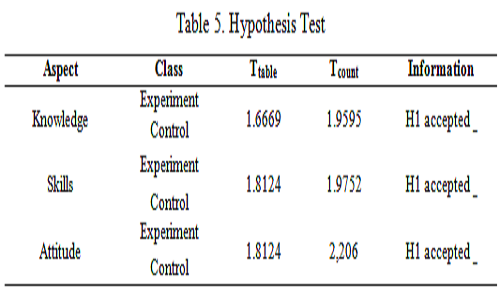
The Effect of LSLC - Based Problem Based Learning Model on Student Learning Outcomes on Atomic Structure Material – Nanomaterials for Class X SMA Penggerak
Abstract
Keywords
Full Text:
PDFReferences
Asmara, L. Y. (2021). Differences Of Cognitive Learning Outcomes With The Addie Learning Model Based On Lesson Study Holistic Learning Strategy And Addie Model At SMA N 7 Rejang Lebong. Journal Of Bioeduscientific, 2(1).
Darmawati, S. (2019). Application of Problem-Based Learning Models on Learning Outcomes of High School Students in Class X Chemical Bonds. Journal of Muara Pendidikan , 4(1), 200-207.
Defista, C., Andromeda, A., & Sovia, E. (2022). The Influence of Guided Inquiry Learning Model Based on Lesson Study for Learning Community on Chemical Equilibrium Material on Student Learning Outcomes of SMAN 1 Padang. IJIS Edu: Indonesian Journal of Integrated Science Education , 4 (1), 40-44.
Hope, E. (2017). The Principal's Vision as a Driver of Education Quality. JMKSP (Journal of Management, Leadership, and Education Supervision), 1(2), 133-145.
Haryanto, Z. (2013). The Effectiveness of Lesson Study Models in the Implementation of Constructivism Learning in SMA/MA in West Kutai Regency, East Kalimantan Province in 2012. Media Communications FPIPS , 12(1).
Harisandy, R. (2015). Increasing Students' Learning Outcomes In Low Voltage Power Control Subjects Through Group Investigation (Gi) Type Cooperative Model. Journal of Electrical Engineering Education , 5(3).
Hosnan, H., Hobri, H., & Dafik, D. (2018). Algebraic learning through caring community based on lesson study for learning community.
ISWARI, NND (2016). The Effect of Problem Based Learning Model Based on Science Literacy on Chemistry Learning Achievement Subject Redox Reactions in Class X Students of SMAN 1 Lingsar Academic Year 2015/2016 (Doctoral Dissertation, University of Mataram).
Junaid, R., & Baharuddin, MR (2020). Improving teacher pedagogic competence through PKM lesson study. To Maega: Journal of Community Service , 3 (2), 122-129.
Pertiwi, NM, & Lukitasari, M. (2019, December). Analysis And Description Of The Use Of Mind Mapping Through Lesson Study For Learning Community (Lslc) On Human Reproductive System Materials. In Proceedings Of The National Seminar On Symbiosis. 4.
Mahesa, A., & Yerimadesi, Y. (2022). The Influence of the Application of the LSLC-Based GDL Model on Student Learning Outcomes at SMA Negeri 15 Padang. Tambusai Journal of Education, 6(1), 1055-1059.
Sugiyono. (2016). Educational Research Methods . Bandung : ALFABETA
Syaifuddin, M., Ummam, AW, Bangkit, SM, Sodiq, AR, & Zakiah, IN (2022). Extension on the Application of Digital Literacy for Students in Facing Online Learning. Altifani Journal of Research and Community Service, 2(1), 1-6.
Widana, IW, & Muliani, NPL (2020). Test requirements analysis.
Yunitasari, R., & Hanifah, U. (2020). The effect of online learning on students' interest in learning during the covid 19 period. Educational: Journal of Educational Sciences, 2(3), 232-243.
Yusuf, M. (2013). Methods of Quantitative, Qualitative and Combined Research . Padang: UNP Press.
DOI: http://dx.doi.org/10.31258/jes.6.4.p.550-560
Refbacks
- There are currently no refbacks.
Copyright (c) 2022 hikmah istiqori

This work is licensed under a Creative Commons Attribution 4.0 International License.
Publisher: FKIP Universitas Riau












